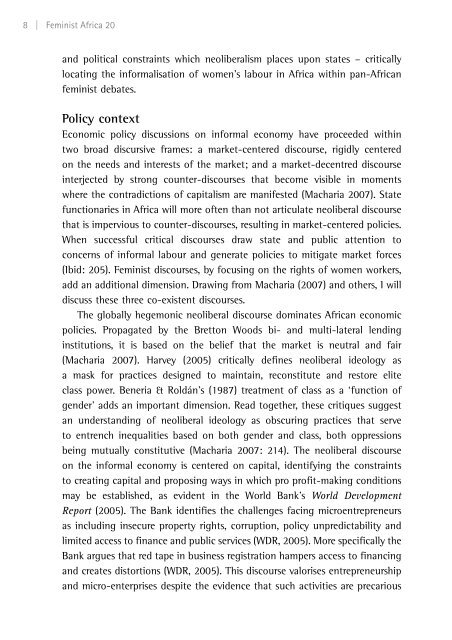Create successful ePaper yourself
Turn your PDF publications into a flip-book with our unique Google optimized e-Paper software.
8 | Feminist Africa 20<br />
<strong>and</strong> political constraints which neoliberalism places upon states – critically<br />
locating the informalisation of women’s labour in Africa within pan-African<br />
feminist debates.<br />
Policy context<br />
Economic policy discussions on informal economy have proceeded within<br />
two broad discursive frames: a market-centered discourse, rigidly centered<br />
on the needs <strong>and</strong> interests of the market; <strong>and</strong> a market-decentred discourse<br />
interjected by strong counter-discourses that become visible in moments<br />
where the contradictions of capitalism are manifested (Macharia 2007). State<br />
functionaries in Africa will more often than not articulate neoliberal discourse<br />
that is impervious to counter-discourses, resulting in market-centered policies.<br />
When successful critical discourses draw state <strong>and</strong> public attention to<br />
concerns of informal labour <strong>and</strong> generate policies to mitigate market forces<br />
(Ibid: 205). Feminist discourses, by focusing on the rights of women workers,<br />
add an additional dimension. Drawing from Macharia (2007) <strong>and</strong> others, I will<br />
discuss these three co-existent discourses.<br />
The globally hegemonic neoliberal discourse dominates African economic<br />
policies. Propagated by the Bretton Woods bi- <strong>and</strong> multi-lateral lending<br />
institutions, it is based on the belief that the market is neutral <strong>and</strong> fair<br />
(Macharia 2007). Harvey (2005) critically defines neoliberal ideology as<br />
a mask for practices designed to maintain, reconstitute <strong>and</strong> restore elite<br />
class power. Beneria & Roldán’s (1987) treatment of class as a ‘function of<br />
gender’ adds an important dimension. Read together, these critiques suggest<br />
an underst<strong>and</strong>ing of neoliberal ideology as obscuring practices that serve<br />
to entrench inequalities based on both gender <strong>and</strong> class, both oppressions<br />
being mutually constitutive (Macharia 2007: 214). The neoliberal discourse<br />
on the informal economy is centered on capital, identifying the constraints<br />
to creating capital <strong>and</strong> proposing ways in which pro profit-making conditions<br />
may be established, as evident in the World Bank’s World Development<br />
Report (2005). The Bank identifies the challenges facing microentrepreneurs<br />
as including insecure property rights, corruption, policy unpredictability <strong>and</strong><br />
limited access to finance <strong>and</strong> public services (WDR, 2005). More specifically the<br />
Bank argues that red tape in business registration hampers access to financing<br />
<strong>and</strong> creates distortions (WDR, 2005). This discourse valorises entrepreneurship<br />
<strong>and</strong> micro-enterprises despite the evidence that such activities are precarious


